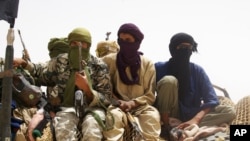NEW YORK — The United Nations Security Council has endorsed mediation efforts in Mali by ECOWAS, the Economic Community of West African States. But it has postponed consideration of an ECOWAS intervention force.
The 15-member Security Council on Thursday unanimously approved a resolution condemning what it calls the forcible seizure of power in March from the democratically elected government of Mali. The resolution reiterates the Council’s full support for ECOWAS mediation efforts in Mali, and expresses deep concern at the increased terrorist threat in the country's north. Raising the possibility of sanctions, the resolution urges countries to submit the names of individuals and groups associated with al-Qaida in the Sahel region, and notably in the north of Mali.
The Security Council resolution takes note of the request of ECOWAS and the African Union for a mandate authorizing the deployment of a stabilization force in Mali. But it says the Council will examine the request only after it receives more information from ECOWAS about the proposed force. The West African group is reported to be developing a plan to send about 3,300 troops to Mali.
During the Council’s discussion, the president of the ECOWAS Commission, Kadre Desire Ouedraogo, said the humanitarian and security situation in northern Mali is worsening daily, even as a political stalemate continues. He called the Security Council resolution an important first step in winning international support for ECOWAS efforts to resolve the crisis.
“This resolution, in fact, would strengthen different aspects of the positions upheld by ECOWAS, particularly in terms of restoring constitutional order and restoring the territorial integrity of Mali and fighting terrorism, as well as the need for a comprehensive strategy for the Sahel region," said Ouedraogo.
Following the Security Council’s meeting, the council’s president, Ambassador Nestor Osorio of Colombia, told reporters the main purpose of the resolution was to support the mediation effort of ECOWAS. He said the council hopes the resolution’s message will be effective enough to avoid the need for additional intervention.
“We hope that this is a message that will help in the restoration of constitutional order. I stress how adamant the Council is about rejecting coup d’etat and the change of constitutional order," said Osorio.
The Security Council resolution also condemns what it terms the desecration, damage and destruction of sites of holy, historic and cultural significance in Mali. Islamist rebels in Timbuktu in northern Mali have reportedly destroyed religious shrines.
The 15-member Security Council on Thursday unanimously approved a resolution condemning what it calls the forcible seizure of power in March from the democratically elected government of Mali. The resolution reiterates the Council’s full support for ECOWAS mediation efforts in Mali, and expresses deep concern at the increased terrorist threat in the country's north. Raising the possibility of sanctions, the resolution urges countries to submit the names of individuals and groups associated with al-Qaida in the Sahel region, and notably in the north of Mali.
The Security Council resolution takes note of the request of ECOWAS and the African Union for a mandate authorizing the deployment of a stabilization force in Mali. But it says the Council will examine the request only after it receives more information from ECOWAS about the proposed force. The West African group is reported to be developing a plan to send about 3,300 troops to Mali.
During the Council’s discussion, the president of the ECOWAS Commission, Kadre Desire Ouedraogo, said the humanitarian and security situation in northern Mali is worsening daily, even as a political stalemate continues. He called the Security Council resolution an important first step in winning international support for ECOWAS efforts to resolve the crisis.
“This resolution, in fact, would strengthen different aspects of the positions upheld by ECOWAS, particularly in terms of restoring constitutional order and restoring the territorial integrity of Mali and fighting terrorism, as well as the need for a comprehensive strategy for the Sahel region," said Ouedraogo.
Following the Security Council’s meeting, the council’s president, Ambassador Nestor Osorio of Colombia, told reporters the main purpose of the resolution was to support the mediation effort of ECOWAS. He said the council hopes the resolution’s message will be effective enough to avoid the need for additional intervention.
“We hope that this is a message that will help in the restoration of constitutional order. I stress how adamant the Council is about rejecting coup d’etat and the change of constitutional order," said Osorio.
The Security Council resolution also condemns what it terms the desecration, damage and destruction of sites of holy, historic and cultural significance in Mali. Islamist rebels in Timbuktu in northern Mali have reportedly destroyed religious shrines.
